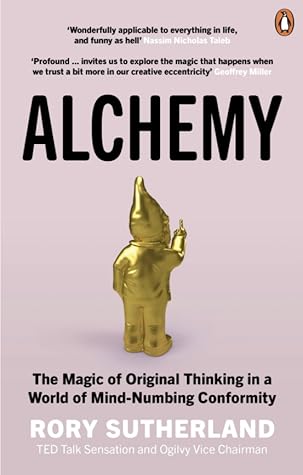More on this book
Community
Kindle Notes & Highlights
Read between
June 2 - June 3, 2019
nobody would say is this: ‘Hey, let’s try marketing a really expensive drink, that comes in a tiny can … and that tastes kind of disgusting.
The human mind does not run on logic any more than a horse runs on petrol.
There are often two reasons behind people’s behaviour: the ostensibly logical reason, and the real reason.
Advertising exists to be noticed, and we have evolved, surely, to pay attention to living things. An evolutionary psychologist might also suggest that a penguin nightlight – a gift for one’s child – might be more emotionally rewarding than a cash reward, which is a gain for oneself.
While in physics the opposite of a good idea is generally a bad idea, in psychology the opposite of a good idea can be a very good idea indeed:
What had emerged was that there were two ways to sell this product: with a very long letter – which was reassuring because it was long, and with a very short letter – which was reassuring because it was very short.
If you have spent the last 20 years as a public health advisor promoting policies designed to create shame, alongside colleagues who all believe the same thing, the last thing you want to hear is ‘Don’t worry about that, because a bloke in China has come up with a gadget which means that the problem to which you have dedicated your life and from which your social status derives is no longer a problem any more.
Upton Sinclair once remarked, ‘It is difficult to get a man to understand something, when his salary depends on his not understanding it.
You are more likely to come up with a good idea focusing on one outlier than on ten average users.
Usually someone has often already found an answer to your problem – just in a different domain.
evolution does not do long-term planning.
The more data you have, the easier it is to find support for some spurious, self-serving narrative. The profusion of data in future will not settle arguments: it will make them worse.
We don’t value things; we value their meaning. What they are is determined by the laws of physics, but what they mean is determined by the laws of psychology.
Create a name, and you’ve created a norm.
If you want to offer ease of use – and ease of purchase – it is often a good idea not to offer people a Swiss Army knife, something that claims to do lots of things.fn8 With the notable exception of the mobile phone, we generally find it easier to buy things that serve a single purpose.
What we wanted from the recipient was not simply the ingestion of information: it was attention, conviction and a sense of import, something that an economically rational 50p stamp could never obtain but that a £10 FedEx envelope could. In the end, the campaign was hugely successful. Almost everyone opened the package and read the contents – and over 10 per cent tried the product, which required a significant amount of effort. In 2018 a digital rationalist would suggest that the way to reach several hundred senior IT people would be via Facebook, or by email – two options which were mercifully
...more
Someone who has not mastered the technique of oblique influence can only envisage direct intervention to achieve the desired effect,
advertising is a hugely expensive way of conveying that you are trustworthy.
why not rank both the offices and the faculty parking spaces between 1 and 100 in order of desirability before allocating them by lottery, with the people who received the best offices receiving the worst parking spots, and vice versa? Under these conditions, people allocate greater importance to the part of the lottery in which they have come out best, while those in the middle reframe the result as being a happy compromise.
I once examined a breakdown of what my local taxes are spent on: it seemed that I paid £25 per year for weekly refuse collection – reframing this as 50p per week, I was struck by what good value it was. For less than the cost of a stamp, someone would come to my house and remove and dispose of several bags of refuse; suddenly the council seemed more impressive than they had before.
One problem with governments is that they generally hate hypothecation, the system whereby taxes are ring-fenced and spent on a pre-defined area of activity. Instead, taxation tends to go into one pot, before being spent wherever it is needed. As a result, we end up resenting taxation more than expenditure that goes towards something we can see, feel or even imagine.
People who are happy to spend £300 on a pair of designer sun-glassesfn2 feel resentful when they are required to pay that amount on funding healthcare, policing, the fire brigade or defence, yet many of us would voluntarily pay more tax if it were possible to specify which service would receive the money.
And if you then gave them a car sticker to display the fact that they had paid more, as the Romans effectively did, even more people would join in. How would that be a bad thing?
This shows that what mattered was not the actions we asked them to perform, but the order in which they were asked to make them.


